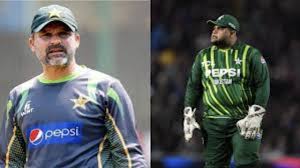Former Pakistan captain Moin Khan has said his son Azam’s confidence has taken a beating because of the inability of the Pakistan selectors and team management to give him a consistent run in the side.
Moin took the example of the T20 World Cup earlier this year in the West Indies and the USA, Azam’s most recent appearance for Pakistan. Azam played only the opening match of Pakistan’s campaign, the Super-Over defeat to USA. He played as wicketkeeper-batter, and scored a first-ball duck. He was dropped thereafter, with Mohammad Rizwan, who played as a specialist batter against USA, taking back the keeper’s gloves.
“I watched the entire World Cup and the matches leading up to it, and it seemed like Azam was the number one choice for wicketkeeping and batting,” Moin told Cricket Pakistan. “Then suddenly, after just one match, the entire strategy was changed.”
Pakistan exited the tournament at the first group stage itself, winning two games and losing to USA and India.”Azam wasn’t given a chance to keep wickets after one match and was dropped after getting out on the very first ball [against USA],” Moin said. “Any player can get out on the first ball, but here the tradition of developing players that used to exist is no longer there. Whether it’s the captain or the management, if they make such quick changes to players, how can we produce good players?”
Azam has faced scrutiny right through his career for his fitness, and while Moin agreed with some of the criticism, he said his son was now working hard on that area.”I’m not saying that all the blame lies with the team management and the captain; Azam has his own shortcomings too,” Moin said. “He needs to make himself physically and mentally stronger, and follow the fitness routines of other sportsmen.
“For the past month or so, I’ve noticed he’s been working hard to improve his fitness with his trainer Shehzar Mohammad, even taking him along to the Caribbean [Premier] League. I hope Azam has learned a lot from this experience.”
Moin expressed strong support for Shaheen Shah Afridi to be Pakistan’s white-ball captain. Shaheen had taken over as T20I captain – and was seen as a frontrunner for the ODI captaincy too – in the wake of Babar Azam’s resignation following the ODI World Cup in India last year. Shaheen’s tenure lasted just one series, however, with Babar reinstated in March.
“Shaheen Afridi has the ability to lead the team and is highly liked by the players. He is an excellent choice for captaincy in T20s,” Moin said. “In white-ball cricket, I don’t see anyone else suitable for the role. Removing him from the captaincy was unjust.”
Moin also advocated for one captain for all formats, and felt that constant leadership changes only stood to affect team performance.”Players may not listen to their captain if there are constant changes,” he said. “If the cricket board provides full support to the captain and assures them of a long-term responsibility, the team’s performance will improve.”
Pakistan exited the tournament at the first group stage itself, winning two games and losing to USA and India.”Azam wasn’t given a chance to keep wickets after one match and was dropped after getting out on the very first ball [against USA],” Moin said. “Any player can get out on the first ball, but here the tradition of developing players that used to exist is no longer there. Whether it’s the captain or the management, if they make such quick changes to players, how can we produce good players?”


